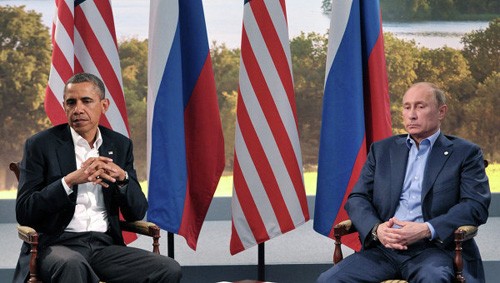(VOVworld) – The G8 summit of leading industrialized nations opened in Northern Ireland on Monday. Its ambitious agenda focuses on how to recover the global economic recession. But disagreements over policies for Syria, particularly whether to arm the rebels or not, have cast a shadow over the G8 summit.

US and Russian leaders met one day before the G8 summit in Northern Ireland (photo: RIA)
|
G8 is made up of the world’s top 8 democratic and industrialized nations – France, Germany, Italy, Japan, the UK, the US, Canada, and Russia. The annual economic and political summit brings together their state leaders and international officials, and is an important opportunity to discuss global economic issues. Countries will undertake an effort to boost trade activities to generate global economic growth. This year’s host country, the UK, wants to advocate measures against tax fraud and increase transparency in trade activities.
However, economic issues seem to be second to the current affairs in Syria. Prior to the summit, the US intelligence assumed that the Syrian government used chemical weapons and the White House quickly decided to arm the opposition forces in this Middle East nation. The US move has ignited strong criticism from Russia. Although the US has not introduced a detailed plan on supplying weapons to the Syrian opposition forces, it left fighter jets F-16 and Patriot missiles on the Jordanian border. While other G8 members support and increased no-fly zones over Syria, Russia consistently rejects it. Moscow said information that the administration of President al-Assad used chemical weapons was fabricated, similar to the deceit about weapons of mass destruction in the possession of Saddam Hussein in Iraq. In a bilateral meeting one day before the G8 summit, US President Obama tried to persuade President Putin to bring representatives of Syrian President Bashar al-Assad to the negotiating table, but Moscow insisted on its stance. Putin boldly described the foes of President al-Assaid as “the people who not only kill their enemies, but open up their bodies, eat their intestines in front of the public and cameras.” Russia says the US’ supplying weapons to the rebel forces will escalate violence. In a meeting with British Prime Minister David Cameron, Putin strongly criticized the west for backing rebels. He declared that he would continue to support President al-Assad and comply with international law in supplying weapons to Syria.
Observers say there is not much hope for a breakthrough for the Syrian situation after the G8 summit. Though they may agree on a date to hold the Syrian peace conference in July, even if all countries want Syria to resolve their issues peacefully, their different approaches will make it impossible to reach a comprehensive solution.
Meanwhile, the situation in Syria is worsening. Western media reported that Iran is to send 4,000 soldiers of the Revolutionary Guard Corps to Syria to back the administration. Together with the Hezbollah movement in Lebanon, Iran has committed to support President al-Assad to fight against the rebel forces, which are backed by the west and some Arabian nations. Iran and the Hezbollah have worked together to open a new battle in Israel to take back the Golan Heights. Around 3,000 to 5,000 Syrian people have been trained in Iran for an order to enter the Golan Heights. Compounding the danger is dangerous information that the Democratic People’s Republic of Korea is suspected of playing a central role in assisting the Syrian government to produce chemical weapons. Pyongyang is said to be transferring technologies for synthesizing chemical agents and making chemical warheads to Syria since the mid-1990s by dispatching chemical weapons experts there. The information has not been proved but amidst the complicated situation, it would provoke a regional war in the near future.
The international community is still waiting for a positive signal from the G8 summit which can bring a hope to stop the 2-year civil war that killed 93,000 people in Syria.